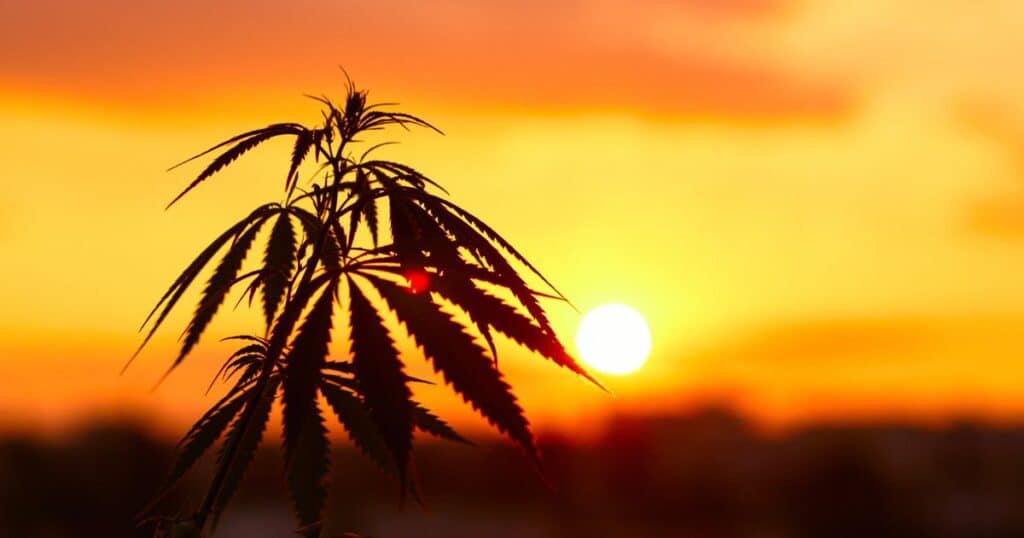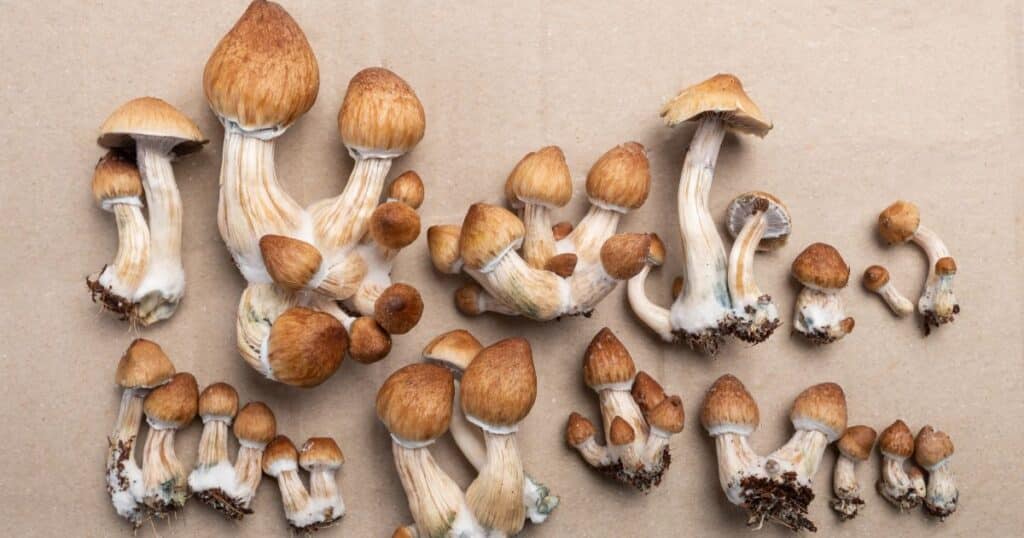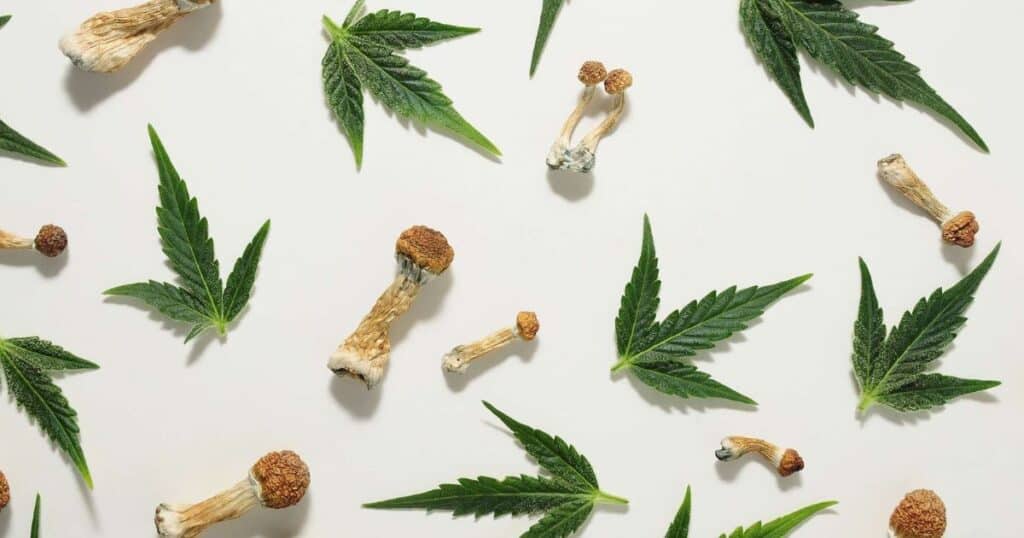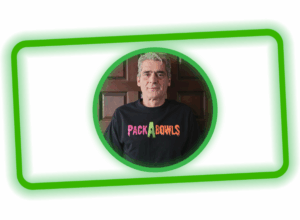For years, the two infamous Schedule I drugs – cannabis and psychedelic mushrooms – have been viewed quite differently. Cannabis has long been perceived as a primarily recreational drug for its euphoric effects. Meanwhile, psychedelics are often considered more of a medically focused experience that can provide psychological healing and spiritual growth.
This difference in perception is reflected in how the two are regulated. While cannabis is still classified as a Schedule I drug, meaning, according to the federal government, that it has high addictive potential and no accepted medical use, psychedelics have been given some leeway to be studied for their therapeutic benefits.

This difference in approach could be attributed to the trail that cannabis has blazed, making it much easier for psychedelics to begin being accepted as behavioral health treatments.
Despite this, both drugs share a Schedule I classification from the U.S. Drug Enforcement Administration (DEA). This highlights the fact that while cannabis has helped to open up society’s view of psychedelics as potential treatments, further progress is still needed in order for them to be de-scheduled and entirely accepted into medical practice.
Nevertheless, the changes that have already been made are pretty remarkable and show the influence that cannabis has had in paving the way for expanded acceptance of psychedelics.
How Cannabis Has Blazed The Trail For Easier Acceptance of Psychedelics
When it comes to how cannabis has helped to make the acceptance of psychedelics as potential treatments easier, there is no doubt that its status as a Schedule I drug has been instrumental.
Cannabis was the first Schedule I drug to gain traction in decriminalization and medical legalization, with many states beginning to legalize or decriminalize it before federal action.
This set an example for other Schedule I drugs – such as psychedelics – to also begin being accepted, albeit with strict regulations and restrictions on their use.
The political push to decriminalize drugs other than marijuana has gained momentum in recent years, thanks in part to groups like the Drug Policy Alliance and its financial backers.
DPA is pushing for the decriminalization of LSD, psilocybin, MDMA, and other psychedelics with the goal of making them available to anyone seeking mental health treatment.
This has been made possible partly because cannabis set an example for other Schedule I drugs, showing that they can be decriminalized and potentially used as medicines despite their status as illicit substances.
How Psychedelics Have Gained Acceptance as Mental Health Treatments
As a result of the political push to decriminalize psychedelics, more research into their potential benefits is being conducted.
This includes the Food and Drug Administration (FDA) releasing guidance for trials related to psychedelic drugs in October 2020. The FDA noted that these trials should focus specifically on safety and efficacy and address any risk factors associated with their use.
The FDA’s guidance has been met with bipartisan support from Congress, with both Republican and Democratic representatives sponsoring legislation that would allow for the medical use of psychedelics. This is a sign of how far these drugs have been accepted as potential treatments in recent years.

Alongside this legislative support, there has also been an uptick in investment in the psychedelics industry. This includes a facility opening in Los Angeles dedicated to the production and sale of psychedelic-assisted therapies, as well as a Canadian drug maker recently raising $80 million for its work on developing drugs based on compounds derived from mushrooms.
These developments highlight how much progress has been made in accepting psychedelics as potential treatments – but also how much further there still is to go.
The Legal Challenges of Psychedelics
Despite the progress made in legalizing psychedelics for medical use, there remain a number of legal challenges that must be addressed before they can become fully accepted treatments.
One of the main issues is that these substances still need to be studied extensively enough to be given a precise classification for medical use, which makes it difficult to regulate them in terms of who can administer them and how they should be used.
Another challenge is the fact that psychedelics are still classified as Schedule I drugs, meaning that even if they are used for medical purposes, they can still be subject to criminal penalties. This has led some states to pass laws that protect users from being prosecuted if they comply with certain regulations related to the use of psychedelics.
The solutions to these legal challenges will likely involve further study into the safety and efficacy of psychedelic drugs and changes in legislation that would allow them to be regulated similarly to cannabis.
This could include the DEA rescheduling psychedelics from Schedule I to Schedule II, which would allow for further research into their potential therapeutic benefits without fear of criminal prosecution. Ultimately, this would set the stage for psychedelics to become accepted treatments alongside cannabis and potentially open up even more possibilities regarding how these drugs can benefit patients.
The Differences In Regulatory Approach
Though marijuana and psychedelics are classified as Schedule I substances, there are some notable differences between the regulatory approaches of these two drugs.
For one, while cannabis is mainly seen as a recreational drug – albeit with potential medical benefits – psychedelics are considered much more of a medically focused experience. This has made it easier for researchers to obtain approval for trials related to their use, as there is more of a focus on the potential therapeutic benefits they could offer.
Additionally, cannabis has been around for much longer than psychedelics – both in terms of its medicinal and recreational applications – so it was easier to gain acceptance for its legalization.
Whereas with psychedelics, there is still much work to be done in terms of convincing lawmakers and regulators of their potential as treatments.
The fact that psychedelics are still classified as Schedule I substances despite the increasing amount of research backing them is a testament to how difficult it can be to gain acceptance for such substances, even when there is evidence of therapeutic benefits.
This shows why cannabis’s legalization was so important in paving the way for other Schedule I substances and why further progress is needed to legalize psychedelics fully. Nevertheless, the recent developments in this area show that change is coming, and psychedelic treatments could soon be a reality.
How Groups Are Avoiding Pitfalls of the Cannabis Movement
Psychedelic advocacy groups have been careful to learn from the mistakes of the marijuana movement in terms of how best to push for legalization.
One of their main strategies has been to avoid going through state governments as much as possible, instead focusing on gaining acceptance through research and patient advocacy. This starkly contrasts how cannabis was legalized – mainly due to ballot initiatives driven by state governments.
The other key difference is in terms of how psychedelics would be used if they become accepted treatments. Unlike cannabis, which has primarily been viewed in the public eye as a recreational drug, psychedelics are seen more as tools for therapy and self-discovery.
This means that access to them would likely be more carefully controlled – with users only able to take them under supervision from a trained clinician. This contrasts with cannabis, which has mostly been made available through unsupervised retail outlets.
Overall, it seems that psychedelic advocacy groups are taking the right approach to gaining acceptance for these drugs as treatments.
By steering clear of state governments and emphasizing their use in supervised clinical settings, they can avoid the pitfalls of the cannabis movement and help to ensure that psychedelics are represented appropriately. This could be a crucial step towards their full legalization and pave the way for more research into their potential therapeutic benefits.
How Psychedelics Can Treat Substance Use Disorders, Depression, PTSD, etc…
In addition to its potential as a recreational drug, psychedelics are increasingly seen as a viable medical treatment for specific conditions. Studies have shown they can effectively treat substance use disorders such as alcohol abuse, depression, and post-traumatic stress disorder (PTSD).
For example, there has been research into the use of LSD to treat alcohol addiction, with studies showing that it can reduce drinking frequency and severity. Similarly, MDMA has been studied as a treatment for severe PTSD cases, with promising results indicating decreased symptoms of the disorder and improved quality of life.
These studies are essential in demonstrating the potential benefits of psychedelics as treatments – something that is increasingly being taken seriously by researchers and medical professionals.
As more evidence is gathered on their effectiveness, psychedelics will likely continue to be seen as a viable alternative to traditional treatments. This could open up new possibilities for those suffering from these conditions and provide further impetus for the full legalization of psychedelics.
The potential benefits of psychedelics cannot be overlooked, and they are slowly but surely gaining acceptance as viable treatments.

While much more research is needed to understand the implications of their use fully, it is clear that they can offer real help to those suffering from various mental health conditions. This could be a breakthrough moment in terms of shifting public perception and moving towards full legalization of psychedelics.
With cannabis already setting the stage for this process, just how far psychedelics can go remains to be seen. With the right approach and continued research, there is no telling what possibilities could open up in the future.
The potential for these substances to improve millions of lives is immense, and this makes it all the more critical that we continue to pursue further studies on their effects and benefits.
The Stigma Around Cannabis has Lessened, Now its Psychedelics Turn
While cannabis has seen a rapid shift in its acceptance over the past decade or so – from a primarily outlawed substance to one that is increasingly accepted for both recreational and medicinal use – psychedelics still face many challenges.
For one thing, there is still a lingering attachment to psychedelics, and this is mainly due to their long history of being associated with illicit activities. This has caused many governments worldwide to take a hard-line stance on them, making it difficult for researchers and advocates to push for decriminalization or legalization.
Moreover, the lack of clinical trials conducted with psychedelics means that there is less data to back up the claims that they can be beneficial for treating mental health conditions.
This makes it difficult for governments and medical professionals to take them seriously as potential treatments, further complicating the process of making them more widely available.
These issues highlight how much work still needs to be done to legalize psychedelics fully. While cannabis has laid the essential groundwork in terms of shifting public perception and paving the way for more research, psychedelics still face a long road ahead.
It is up to advocates and researchers to continue pushing for change and gathering evidence on their potential benefits – only then will they be able to gain the acceptance needed to become widely available treatments for mental health conditions.
This should remain the focus of psychedelic advocacy groups, as it is the only way to ensure that these substances can be used to help those who need them the most. With cannabis already leading the way, psychedelics could soon follow in its footsteps and make a real difference in people’s lives.
Enjoyed that first hit? Come chill with us every week at the Friday Sesh for a freshly packed bowl of the week’s best cannabis news!
















